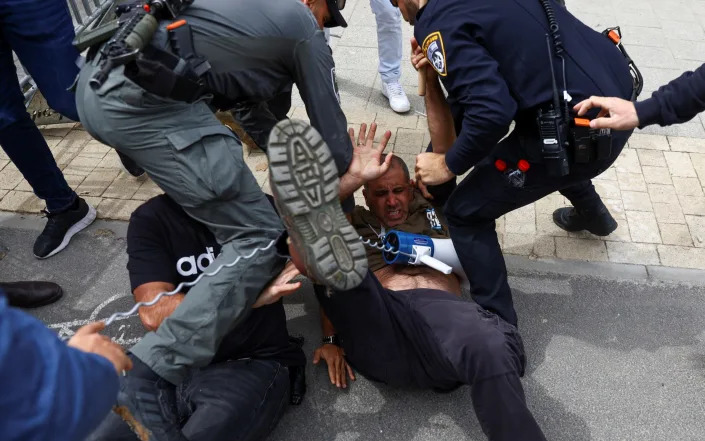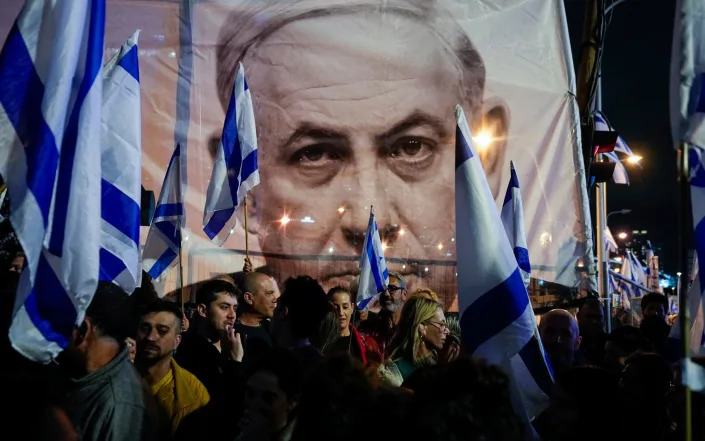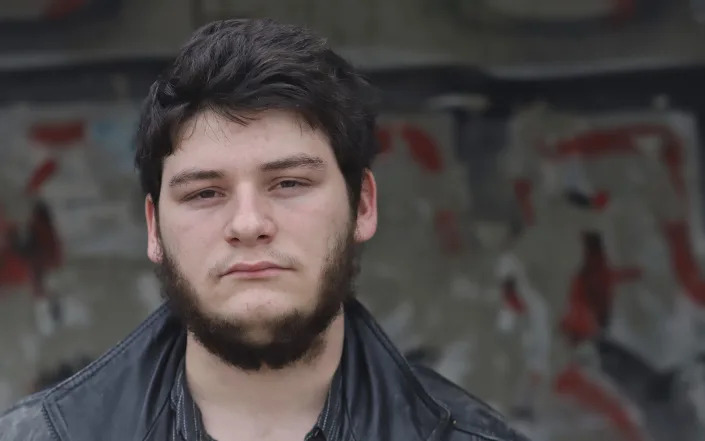James Rothwell
THE TELEGRAPH.UK
Thu, March 23, 2023

Benjamin Netanyahu made a surprise return to the premiership in elections last November
It's just after lunchtime in Tel Aviv and an unlikely band of rebels has taken over the streets: one thousand furious, flag-waving grandmothers.
"My beloved Israel is falling apart - it's even stronger than falling apart, it's ruined," 77-year-old Mikki, a grandmother-of-six, tells The Telegraph as she pauses for a rest on a park bench.
"The country is turning into a fascist and anti-democratic place," warns another grandma, Esther Shalev, who then mutters darkly: "I hate him. He's destroying the country."
Both women were alluding to Benjamin Netanyahu, the smooth-talking juggernaut of Israeli politics who managed a surprise comeback to the premiership in elections last November.
But victory for the man known as "King Bibi" has carried a severe price: to secure a majority and regain the throne, he has ended up forming the most right-wing coalition in the country's history.
That risky move has plunged him into a bitter, divisive battle with thousands of Israelis, notably over his government's ongoing plans to overhaul the legal system.
It has also exposed a much deeper rift at the heart of Israeli society between the secular, liberal middle class and poorer religious conservatives, prompting Isaac Herzog, the Israeli president, to warn that the nation is on the brink of "civil war."

Police detain a demonstrator during the "Day of Shutdown" protest on Thursday in Tel Aviv - RONEN ZVULUN/REUTERS
To make matters even more tense, the furore comes as the country faces a major security crisis with the Palestinians that could spiral into open warfare.
Amid the turmoil, on Thursday Mr Netanyahu travels to Britain for his first meeting with Rishi Sunak since being re-elected, with the focus said to be on forming a joint strategy against Iran.
At the same time, back in Tel Aviv and Jerusalem, thousands of Israelis took to the streets en masse to escalate a months-long protest against the government's overhaul of the court system, burning tyres, blocking roadways and clashing with police.
'This is not the country I inherited'
Within weeks of being sworn in, Mr Netanyahu's bid to impose his flagship policy - a major overhaul of the country's legal system - saw him besieged by tens of thousands of demonstrators urging him to abandon what they claim is an existential threat to Israeli democracy.
Protesters have blocked roads and train stations, threatened to stop Mr Netanyahu from flying out of Ben Gurion airport and have even launched kayak expeditions to his private villa to voice their discontent.
During one bizarre episode, Sara Netanyahu, the prime minister's wife, was trapped inside a hair salon by protesters in Tel Aviv as they chanted: “The country is burning and Sara is getting a haircut." She was later rescued from the salon by Israeli security forces.
The reforms, critics claim, will "destroy" Israeli democracy by weakening the supreme court and boosting the government's influence over the appointment of judges.

Israelis protest against plans by Prime Minister Benjamin Netanyahu's government to overhaul the Israel's judicial system in Tel Aviv in March - Ohad Zwigenberg/AP
Mr Netanyahu denies this, insisting the overhaul will strip the courts of what he claims is a longstanding left-wing bias. Other supporters of the reform claim that their impact on the rule of law has been exaggerated and that they simply bring the system into line with other Western democracies.
At the same time, Mr Netanyahu continues to stand trial on corruption and fraud charges which he strongly denies, in what is proving to be an extremely lengthy and complex legal process. Some of his most ardent critics have claimed that the legal reform package is a covert attempt to scrap his trial altogether.
On Thursday, Israel's parliament passed the first of several laws that make up its contentious judicial overhaul.
The legislation would make it harder for an Israeli leader to be deemed unfit to rule.
Critics say the law is tailor-made for Mr Netanyahu, encourages corruption and deepens a gaping chasm between Israelis over the judicial overhaul.
It stipulates that a prime minister can only be classified as unfit to rule for health or mental reasons and that only he or his government can make that decision.
It comes after the country’s attorney general has faced growing calls by Netanyahu opponents to declare him unfit to rule over his legal problems. The attorney general has already barred the prime minister from involvement in the legal overhaul, saying he is at risk of a conflict of interest because of his corruption trial.
A former special forces commando who was born one year after the founding of Israel, Mr Netanyahu's own history is intertwined with the country. Many Israelis simply cannot imagine a political landscape without him, and even his strongest critics concede that in previous decades he was an extraordinary advocate for Israel.
But in more recent years, a string of scandals involving Mr Netanyahu and his colourful family have scrubbed off much of that sheen. At the centre of his corruption trial is the claim that during his previous terms he accepted bribes, mainly cigars, jewellery and champagne cases, from various businessmen.
He is also accused of granting regulatory favours to a telecoms company in exchange for positive media coverage. Mr Netanyahu, 73, has dismissed all the accusations as a "witch-hunt."
His wife Sara, 64, has been convicted for misusing state funds to have meals delivered to the family home, despite the Netanyahus having a personal chef. And in 2020, a former housemaid filed a lawsuit against the Netanyahus, alleging that Sara mistreated staff by screaming at them and forbidding them to eat or drink on the job. Ms Netanyahu has denied mistreating staff.

A protester holds a placard that says "Jewish and racist, right" during an anti Judicial reform night protest in Tel Aviv - Eyal Warshavsky/SOPA Images/Shutterstock
Another major source of unrest in Israel is the presence of extremists such as Itamar Ben-Gvir and Bezalel Smotrich in Mr Netanyahu's government - the culmination of a long-term drift towards the far-Right in Israeli politics.
Despite having convictions for anti-Arab racism and supporting Jewish terrorism, Mr Ben-Gvir is currently serving as Israel's security minister. Meanwhile, Mr Smotrich, a self-styled "fascist homophobe" who has claimed that "there is no such thing as a Palestinian people" is the coalition's finance minister.
Both men enjoy huge support among Israel's religious and settler communities, which handed them strong results in November's elections and plenty of leverage in the coalition talks that followed.
Without them, Mr Netanyahu would not have managed to return to power. But some Israelis feel that by allowing extremists into government he has simply gone too far.
'Every person has to choose whether they are standing with the regime or against the regime'
Dressed in jeans and a baggy leather jacket, Naveh Shabtay hardly stands out among the dozens of teenagers heading into a Tel Aviv military base to begin national service.
But unlike the others, Naveh has packed his bags for jail life: once through the door, he will announce he is a conscientious objector and be marched off to a military prison cell.
Asked why he is refusing, Naveh cites the ongoing Israeli occupation of the West Bank and Gaza - but also cites Mr Netanyahu's pact with extremists as a key factor in his decision.
"We can see a fascist government is rising today, with our national defence minister being part of a party that is called Jewish Power," Naveh said, referring to Mr Ben Gvir's "Otzma Yehudit" party. "If it sounds similar to White Power it's because it's basically the same."
"We're in a situation where every person in this country has to choose whether they are standing with the regime or against the regime, it's no longer a decision that is made with far-leftists," he adds.

Naveh Shabtay, 19, a refusenik or an Israeli military draft evader for political reasons, is seen moments before entering the recruiting military base in Tel Aviv - Quique Kierszenbaum
"Refuseniks" are a longstanding tradition in Israel's vibrant left-wing movement, and one that has typically been more of an annoyance than a threat to the Israel Defence Forces [IDF].
But according to Mesarvot, a grassroots organisation that supports conscientious objectors, this year the movement is expanding across the political spectrum amid unease over the new government.
"Since this new government we saw a very steep rise in people approaching us, both conscripts and reservists asking for our help either in refusing to serve publicly or for finding another way out," Nimrod Flashenberg, the group's spokesman, said.
"We've seen an even more significant increase since the legal overhaul."
Even more worryingly for Mr Netanyahu, hundreds of IDF reservists, including elite troops, have threatened to stop turning up for duty from this Sunday unless the legal reform package is scrapped.
This includes Israeli Air Force pilots, who unlike the infantry must train on an almost weekly basis and are heavily relied upon by the armed forces.
Even some of Israel's most prestigious veterans have joined the protest movement, including special forces troops who took part in the legendary Entebbe operation that was led by Yoni, Mr Netanyahu's late brother.
It is unclear how severely the refusals by reservists and raw recruits will affect Israel's combat capabilities, as it appears most will only stop reporting for duty once the reforms have been passed.
But it still comes at a point where Israel is facing potentially its most severe security crisis in decades. And some Israelis are so concerned that - with the government's approval - they are taking security into their own hands.
'This is a very dangerous direction'
Tali, an Israeli catering assistant, is buying her first gun. Shortly after lunchtime, the 31-year-old slips into a discrete shop in West Jerusalem where dozens of firearms are laid out under a glass counter.
It's the last step in a six-month application process for Tali, and one that she did not embark on lightly. Her husband already owns a firearm, she says, and she can hardly bear to even touch it.

Guns for sale are seen at a Jerusalem shooting ranges

The government plans to ease restrictions on who can obtain a weapon

Israel's "grandmothers for democracy" protest on Wednesday - Oded Balilty/AP
Wednesday's highly unusual "Grandmothers for democracy" march also reflects how Mr Netanyahu's reforms have met far wider opposition than he expected - and that the bombastic Israeli leader may have bitten off more than he can chew.
"This is not the country I inherited," says grandmother Ms Shalev, who has followed Mr Netanyahu's career since his early days as an Israeli special forces commando.
"Now one of my grandchildren is saying he doesn't want to live in Israel. That breaks my heart."
Thu, March 23, 2023

Benjamin Netanyahu made a surprise return to the premiership in elections last November
It's just after lunchtime in Tel Aviv and an unlikely band of rebels has taken over the streets: one thousand furious, flag-waving grandmothers.
"My beloved Israel is falling apart - it's even stronger than falling apart, it's ruined," 77-year-old Mikki, a grandmother-of-six, tells The Telegraph as she pauses for a rest on a park bench.
"The country is turning into a fascist and anti-democratic place," warns another grandma, Esther Shalev, who then mutters darkly: "I hate him. He's destroying the country."
Both women were alluding to Benjamin Netanyahu, the smooth-talking juggernaut of Israeli politics who managed a surprise comeback to the premiership in elections last November.
But victory for the man known as "King Bibi" has carried a severe price: to secure a majority and regain the throne, he has ended up forming the most right-wing coalition in the country's history.
That risky move has plunged him into a bitter, divisive battle with thousands of Israelis, notably over his government's ongoing plans to overhaul the legal system.
It has also exposed a much deeper rift at the heart of Israeli society between the secular, liberal middle class and poorer religious conservatives, prompting Isaac Herzog, the Israeli president, to warn that the nation is on the brink of "civil war."

Police detain a demonstrator during the "Day of Shutdown" protest on Thursday in Tel Aviv - RONEN ZVULUN/REUTERS
To make matters even more tense, the furore comes as the country faces a major security crisis with the Palestinians that could spiral into open warfare.
Amid the turmoil, on Thursday Mr Netanyahu travels to Britain for his first meeting with Rishi Sunak since being re-elected, with the focus said to be on forming a joint strategy against Iran.
At the same time, back in Tel Aviv and Jerusalem, thousands of Israelis took to the streets en masse to escalate a months-long protest against the government's overhaul of the court system, burning tyres, blocking roadways and clashing with police.
'This is not the country I inherited'
Within weeks of being sworn in, Mr Netanyahu's bid to impose his flagship policy - a major overhaul of the country's legal system - saw him besieged by tens of thousands of demonstrators urging him to abandon what they claim is an existential threat to Israeli democracy.
Protesters have blocked roads and train stations, threatened to stop Mr Netanyahu from flying out of Ben Gurion airport and have even launched kayak expeditions to his private villa to voice their discontent.
During one bizarre episode, Sara Netanyahu, the prime minister's wife, was trapped inside a hair salon by protesters in Tel Aviv as they chanted: “The country is burning and Sara is getting a haircut." She was later rescued from the salon by Israeli security forces.
The reforms, critics claim, will "destroy" Israeli democracy by weakening the supreme court and boosting the government's influence over the appointment of judges.

Israelis protest against plans by Prime Minister Benjamin Netanyahu's government to overhaul the Israel's judicial system in Tel Aviv in March - Ohad Zwigenberg/AP
Mr Netanyahu denies this, insisting the overhaul will strip the courts of what he claims is a longstanding left-wing bias. Other supporters of the reform claim that their impact on the rule of law has been exaggerated and that they simply bring the system into line with other Western democracies.
At the same time, Mr Netanyahu continues to stand trial on corruption and fraud charges which he strongly denies, in what is proving to be an extremely lengthy and complex legal process. Some of his most ardent critics have claimed that the legal reform package is a covert attempt to scrap his trial altogether.
On Thursday, Israel's parliament passed the first of several laws that make up its contentious judicial overhaul.
The legislation would make it harder for an Israeli leader to be deemed unfit to rule.
Critics say the law is tailor-made for Mr Netanyahu, encourages corruption and deepens a gaping chasm between Israelis over the judicial overhaul.
It stipulates that a prime minister can only be classified as unfit to rule for health or mental reasons and that only he or his government can make that decision.
It comes after the country’s attorney general has faced growing calls by Netanyahu opponents to declare him unfit to rule over his legal problems. The attorney general has already barred the prime minister from involvement in the legal overhaul, saying he is at risk of a conflict of interest because of his corruption trial.
A former special forces commando who was born one year after the founding of Israel, Mr Netanyahu's own history is intertwined with the country. Many Israelis simply cannot imagine a political landscape without him, and even his strongest critics concede that in previous decades he was an extraordinary advocate for Israel.
But in more recent years, a string of scandals involving Mr Netanyahu and his colourful family have scrubbed off much of that sheen. At the centre of his corruption trial is the claim that during his previous terms he accepted bribes, mainly cigars, jewellery and champagne cases, from various businessmen.
He is also accused of granting regulatory favours to a telecoms company in exchange for positive media coverage. Mr Netanyahu, 73, has dismissed all the accusations as a "witch-hunt."
His wife Sara, 64, has been convicted for misusing state funds to have meals delivered to the family home, despite the Netanyahus having a personal chef. And in 2020, a former housemaid filed a lawsuit against the Netanyahus, alleging that Sara mistreated staff by screaming at them and forbidding them to eat or drink on the job. Ms Netanyahu has denied mistreating staff.

A protester holds a placard that says "Jewish and racist, right" during an anti Judicial reform night protest in Tel Aviv - Eyal Warshavsky/SOPA Images/Shutterstock
Another major source of unrest in Israel is the presence of extremists such as Itamar Ben-Gvir and Bezalel Smotrich in Mr Netanyahu's government - the culmination of a long-term drift towards the far-Right in Israeli politics.
Despite having convictions for anti-Arab racism and supporting Jewish terrorism, Mr Ben-Gvir is currently serving as Israel's security minister. Meanwhile, Mr Smotrich, a self-styled "fascist homophobe" who has claimed that "there is no such thing as a Palestinian people" is the coalition's finance minister.
Both men enjoy huge support among Israel's religious and settler communities, which handed them strong results in November's elections and plenty of leverage in the coalition talks that followed.
Without them, Mr Netanyahu would not have managed to return to power. But some Israelis feel that by allowing extremists into government he has simply gone too far.
'Every person has to choose whether they are standing with the regime or against the regime'
Dressed in jeans and a baggy leather jacket, Naveh Shabtay hardly stands out among the dozens of teenagers heading into a Tel Aviv military base to begin national service.
But unlike the others, Naveh has packed his bags for jail life: once through the door, he will announce he is a conscientious objector and be marched off to a military prison cell.
Asked why he is refusing, Naveh cites the ongoing Israeli occupation of the West Bank and Gaza - but also cites Mr Netanyahu's pact with extremists as a key factor in his decision.
"We can see a fascist government is rising today, with our national defence minister being part of a party that is called Jewish Power," Naveh said, referring to Mr Ben Gvir's "Otzma Yehudit" party. "If it sounds similar to White Power it's because it's basically the same."
"We're in a situation where every person in this country has to choose whether they are standing with the regime or against the regime, it's no longer a decision that is made with far-leftists," he adds.

Naveh Shabtay, 19, a refusenik or an Israeli military draft evader for political reasons, is seen moments before entering the recruiting military base in Tel Aviv - Quique Kierszenbaum
"Refuseniks" are a longstanding tradition in Israel's vibrant left-wing movement, and one that has typically been more of an annoyance than a threat to the Israel Defence Forces [IDF].
But according to Mesarvot, a grassroots organisation that supports conscientious objectors, this year the movement is expanding across the political spectrum amid unease over the new government.
"Since this new government we saw a very steep rise in people approaching us, both conscripts and reservists asking for our help either in refusing to serve publicly or for finding another way out," Nimrod Flashenberg, the group's spokesman, said.
"We've seen an even more significant increase since the legal overhaul."
Even more worryingly for Mr Netanyahu, hundreds of IDF reservists, including elite troops, have threatened to stop turning up for duty from this Sunday unless the legal reform package is scrapped.
This includes Israeli Air Force pilots, who unlike the infantry must train on an almost weekly basis and are heavily relied upon by the armed forces.
Even some of Israel's most prestigious veterans have joined the protest movement, including special forces troops who took part in the legendary Entebbe operation that was led by Yoni, Mr Netanyahu's late brother.
It is unclear how severely the refusals by reservists and raw recruits will affect Israel's combat capabilities, as it appears most will only stop reporting for duty once the reforms have been passed.
But it still comes at a point where Israel is facing potentially its most severe security crisis in decades. And some Israelis are so concerned that - with the government's approval - they are taking security into their own hands.
'This is a very dangerous direction'
Tali, an Israeli catering assistant, is buying her first gun. Shortly after lunchtime, the 31-year-old slips into a discrete shop in West Jerusalem where dozens of firearms are laid out under a glass counter.
It's the last step in a six-month application process for Tali, and one that she did not embark on lightly. Her husband already owns a firearm, she says, and she can hardly bear to even touch it.

Guns for sale are seen at a Jerusalem shooting ranges
- Quique Kierszenbaum
"It was a difficult decision," says Tali, a resident of Jerusalem's flashpoint Old City. "There are two reasons I'm buying it: The first is for when I am driving, because I work for a catering company in Judea and Samaria [the West Bank], where I feel exposed. And the second reason is for my home. At the end of the day, I want to defend my children if someone enters."
As Israel conducts nearly-daily raids on Palestinian militants in the West Bank, which have led to a spate of deadly revenge attacks on Israelis civilians, Mr Netanyahu has encouraged citizens like Tali to arm themselves in case they need to return fire against militants.
Israel is also heading into a flashpoint period in which Easter, Ramadan and Passover coincide. It means an increased risk of clashes between Palestinians and Israelis in Jerusalem, as was the case in May 2021 when violent scuffles at the al-Aqsa mosque compound escalated into a full-scale conflict between Israel and Hamas in Gaza.
Just three months into 2023, dozens of Palestinians and Israelis have been killed in a fresh escalation of the conflict, and it is feared that a major new confrontation, such as a Palestinian "intifada," could be on the way.
"It was a difficult decision," says Tali, a resident of Jerusalem's flashpoint Old City. "There are two reasons I'm buying it: The first is for when I am driving, because I work for a catering company in Judea and Samaria [the West Bank], where I feel exposed. And the second reason is for my home. At the end of the day, I want to defend my children if someone enters."
As Israel conducts nearly-daily raids on Palestinian militants in the West Bank, which have led to a spate of deadly revenge attacks on Israelis civilians, Mr Netanyahu has encouraged citizens like Tali to arm themselves in case they need to return fire against militants.
Israel is also heading into a flashpoint period in which Easter, Ramadan and Passover coincide. It means an increased risk of clashes between Palestinians and Israelis in Jerusalem, as was the case in May 2021 when violent scuffles at the al-Aqsa mosque compound escalated into a full-scale conflict between Israel and Hamas in Gaza.
Just three months into 2023, dozens of Palestinians and Israelis have been killed in a fresh escalation of the conflict, and it is feared that a major new confrontation, such as a Palestinian "intifada," could be on the way.

The government plans to ease restrictions on who can obtain a weapon
- Quique Kierszenbaum
Mr Netanyahu says he hopes to reduce the risk to Israelis with his gun permit reforms, which may prove to be a highly popular policy for a government which has at times been overwhelmed by criticism.
But Palestinians and some Israeli critics of Mr Netanyahu fear that allowing more citizens to carry guns will encourage them to take the law into their own hands.
Ahmad Tibi, a prominent Palestinian politician with Israeli citizenship, told The Telegraph: "This is a very dangerous direction, it will cause more and more killings, encouraging citizens to take the law into their own hands and shoot Arabs, any Arabs."
As Mr Netanyahu heads for Britain on Thursday, he may perhaps feel somewhat relieved to leave behind the mass demonstrations, army rebels and mounting security headaches.
But despite a loose commitment from Israeli and Palestinian leaders to avoid escalation over Ramadan and Passover, and rumours that a compromise on the legal reforms are in the wings, all three crises will still be waiting for him when he gets back.
Mr Netanyahu says he hopes to reduce the risk to Israelis with his gun permit reforms, which may prove to be a highly popular policy for a government which has at times been overwhelmed by criticism.
But Palestinians and some Israeli critics of Mr Netanyahu fear that allowing more citizens to carry guns will encourage them to take the law into their own hands.
Ahmad Tibi, a prominent Palestinian politician with Israeli citizenship, told The Telegraph: "This is a very dangerous direction, it will cause more and more killings, encouraging citizens to take the law into their own hands and shoot Arabs, any Arabs."
As Mr Netanyahu heads for Britain on Thursday, he may perhaps feel somewhat relieved to leave behind the mass demonstrations, army rebels and mounting security headaches.
But despite a loose commitment from Israeli and Palestinian leaders to avoid escalation over Ramadan and Passover, and rumours that a compromise on the legal reforms are in the wings, all three crises will still be waiting for him when he gets back.

Israel's "grandmothers for democracy" protest on Wednesday - Oded Balilty/AP
Wednesday's highly unusual "Grandmothers for democracy" march also reflects how Mr Netanyahu's reforms have met far wider opposition than he expected - and that the bombastic Israeli leader may have bitten off more than he can chew.
"This is not the country I inherited," says grandmother Ms Shalev, who has followed Mr Netanyahu's career since his early days as an Israeli special forces commando.
"Now one of my grandchildren is saying he doesn't want to live in Israel. That breaks my heart."
No comments:
Post a Comment